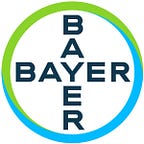Making a Difference Like Mom
By Joanna Carroll, Senior Representative, Corporate Social Responsibility, Bayer U.S.
We all remember being asked, “What do you want to be when you grow up?”
I’ve always had the same answer for this question: a teacher and a mom. I imagine this is because I worshipped (and still do) my own mom, who is a teacher herself.
So, it’s no surprise that I initially followed in her footsteps and started my career in teaching. As an early elementary school teacher in a low-income school district, I enjoyed making a difference but I felt confined to the four walls of my classroom. To this day, I still miss the amazing feeling of seeing one of my students have their “aha! moment” when everything finally clicked and they read their first sentence in a book. But, I felt the breadth of the impact I could have was limited. There were issues beyond my classroom that affected my students and others that I needed to help change including reforming policies that prohibited educational and career opportunities and raising awareness about the effects of poverty and trauma on school behavior and success. I also wanted to educate myself about and help address issues of gender and race in the education system.
So now, let’s fast forward a few years…
Led by my passion for change, I received my Masters in Education Policy and worked with government agencies and non-profits to reform education programs in urban communities. Additionally, I held a number of Corporate Social Responsibility (CSR) roles.
The question you’re likely asking yourself now is a fair one: “How did this person end up at Bayer?”
Let me explain by sharing three key takeaways from my experiences:
I am passionate about education (clearly), but I’ve realized my real passion is helping others and creating opportunities for success where they may not otherwise exist. I’ve had the privilege of being part of a passionate team at Bayer that takes on one of today’s biggest challenges in the workforce — ensuring historically underrepresented populations have the exposure, opportunities and encouragement to pursue careers in the Science, Technology, Engineering, and Math (STEM) fields. For example, Bayer’s Making Science Make Sense® (MSMS) education initiative engages students from various backgrounds and abilities in hands-on, inquiry-based learning to advance science literacy. As a volunteer, I experience first-hand the program’s impact and students’ excitement as they see an “Alka-Rocket” launch or make “Elephant Toothpaste” as part of this program. Not only are these experiments fun, but they expose students to the possibilities of science, including a potential career, they may not have considered otherwise. I’m driven in my career by these innovative initiatives that address society’s most crucial problems and provide people with opportunities.
Change can only happen when we make strong, collaborative public/private partnerships to address societal issues. Bayer has strong non-profit partners both nationally and regionally that do important work in their communities. I’ve seen how many of these organizations lack important resources they need to fully achieve their mission — this could be money, volunteers, and/or thought partners. Combining the strengths of both non-profits and corporations can really help to make change in a community, helping each other to fill the gaps that pose challenges or barriers to reach social impact goals. Real change can only happen when we’re committed to it together.
There is power in people. This is a BIG one that I believe is at the heart of Bayer’s CSR work. In Bayer’s communities, both on the local and national levels, employee volunteers give our corporation a face in the community. It’s through company-wide initiatives like Community Service Day; opportunities with Bayer’s Business Resource Groups (BRGs) — like Habitat for Humanity’s Women Builds and personal initiatives generated by individual employees, that Bayer makes a substantial and recognizable impact in the communities where we live, work and play. Not only does this support Bayer’s reputation as a good corporate citizen, but it engages employees in a way that’s meaningful — increasing morale, engagement and retention — and to put it simply — makes them happy!
This is all to say Bayer is in a position to make real change. I recently had the opportunity to host employee events in New Jersey during National Volunteer Week. I was inspired by the interest and excitement of employees who wanted to be engaged in the community. It was through their feedback, the stories they shared and the sentiments they expressed about Bayer as a real driver of impact that I was inspired, motivated and encouraged to continue on my unique and special career path. And while it’s true I didn’t stay in the classroom as a teacher like my mom, I hope that, through my career, I’ve embodied what made me admire her in the first place — her passion and drive to make a real difference.
Callouts
Making Science Make Sense®, Bayer’s company-wide science, technology, engineering and math (STEM) education initiative, seeks to advance science literacy across the United States through hands-on, inquiry-based learning, purpose-driven employee volunteerism, community-focused partnerships and a public education campaign.
Community Service Day is an annual event where Bayer employees volunteer across the country.
Business Resource Groups (BRGs) are voluntary, company sponsored groups of employees who work together to promote cultural diversity, awareness, and education and are key partners in Bayer’s efforts to cultivate an inclusive environment and to engage employees around critical Inclusion & Diversity objectives.
At Women’s Builds groups of employees who are members of Bayer’s Women’s Leadership Initiative help build homes for Habitat for Humanity.
